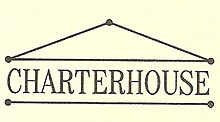Charterhouse Bank
 From Wikipedia - Reading time: 4 min
From Wikipedia - Reading time: 4 min
 | |
| Company type | Public |
|---|---|
| Industry | Banking |
| Founded | 1920 |
| Defunct | 2000 |
| Fate | Acquired |
| Successor | HSBC |
| Headquarters | London, UK |
Key people | Sir Victor Blank, (Chairman and CEO) |
Charterhouse Bank was a British investment bank.
History
[edit]Charterhouse Bank was incorporated as an investment bank in December 1920.[1] In 1925, Charterhouse Investment Trust was created,[2] with its first sponsored issue being that of International Pulp and Chemical Company in 1926.[3] Charterhouse Investment Trust also started buying department stores in London, floating United Drapery Stores as the holding company for its retail investments in 1927.[4][5] In 1963 Charterhouse Bank merged with S. Japhet and Company, a rival investment bank established by Saemy Japhet (1858–1954), to form Charterhouse Japhet.[6]
A US-based arm, Charterhouse Group, was formed in 1973, but became independent of its parent in the 1980s.[7] In 1981 Charterhouse Japhet acquired Keyser Ullman, a substantial but failing rival.[8] In November 1983, Jacob Rothschild merged his own investment business, RIT & Northern, into Charterhouse Japhet and took a controlling stake in the combined business which was briefly known as Charterhouse J. Rothschild.[9] Rothschild then sold the banking business, still known as Charterhouse Japhet, to the Royal Bank of Scotland in January 1985.[10] From 1985 to 1996 Sir Victor Blank held the posts of chairman and chief executive of the banking business, which reverted to its original name, Charterhouse Bank.[11]
Royal Bank of Scotland sold 90% of Charterhouse Bank (retaining 10%) to two continental banks, Crédit Commercial de France and Berliner Handels- und Frankfurter Bank in February 1993.[12] Crédit Commercial de France acquired Berliner Handels- und Frankfurter Bank in the late 1990s,[13] so consolidating its investment in Charterhouse Bank, but was itself taken over by HSBC in 2000.[14]
In June 2001, the management of Charterhouse Capital Partners, the private equity unit of Charterhouse Bank, completed a management buyout from HSBC to become an independent private equity business.[15] Similarly, in May 2011, the management of HSBC Specialist Investments (later InfraRed Capital Partners) completed a management buyout from HSBC to become an independent infrastructure investment business.[16]
References
[edit]- ^ "Charterhouse Management Services Limited". Companies House. Retrieved 13 April 2017.
- ^ Dennett, Laurie (1979). The Charterhouse Group, 1925-1979: A History.
- ^ Slinn. Judy (1993). Clifford Chance: Its Origins and Development. p. 128. ISBN 9780906782989.
- ^ Daily Consular and Trade Reports. 9 January 1928. p. 81.
- ^ Swinson. C (2019). Share Trading, Fraud and the Crash of 1929: A Biography of Clarence Hatry. ISBN 9780429648922.
- ^ "Saemy Japhet, Banker and Philanthropist, Dies in London at 95". Jewish Telegraphic Agency. 4 February 1954. Retrieved 13 April 2017.
- ^ "Charterhouse Group Announces Exit Of Investment In Oakleaf Global Holdings, Inc. in a $655 Million Transaction". PR Newswire. 1 August 2007. Retrieved 13 April 2017.
- ^ Grady, John; Weale, Martin (1986). British Banking, 1960–85. Palgrave Macmillan. p. 156. ISBN 978-1-349-07537-9.
- ^ "Rothschild merger in Britain". New York Times. 4 November 1983. Retrieved 14 April 2017.
- ^ "European dreams: Charterhouse Bank". The Economist. 13 February 1993. Archived from the original on 14 April 2017. Retrieved 13 April 2017.
- ^ "Profile: Sir Victor Blank". The Daily Telegraph. London. 2006-01-26. Retrieved 2007-09-12.
- ^ "Charterhouse sold to continental banks for pounds 235m". The Independent. 7 February 1993. Retrieved 13 April 2017.
- ^ "Big Bang 1986: A Revolution in UK Securities and Investment Banking". Archived from the original on 14 April 2017. Retrieved 13 April 2017.
- ^ "HSBC Holdings Agrees to Buy Credit Commercial de France". 3 April 2000. Retrieved 13 April 2017.
- ^ "Charterhouse sticks to its winning formula". Financial News. 12 January 2009. Retrieved 13 April 2017.
- ^ "HSBC completes spin-out of infra-funds firm". Financial News. 3 May 2011. Retrieved 13 April 2017.
 KSF
KSF